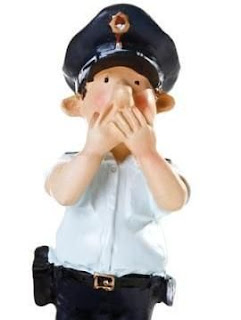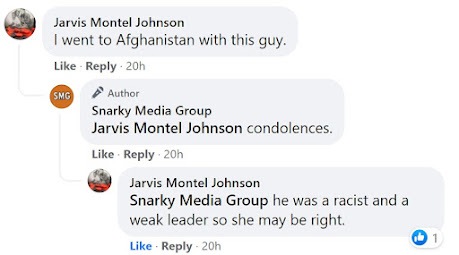Blue Code of Silence
Blue Code of Silence
The examples and perspective in this article deal primarily with the United States and do not represent a worldwide view of the subject.
The Blue Code of Silence (also known as the Blue Shield, Blue Wall, Curtain, Veil, or Cocoon) is an unwritten rule among police officers in the United States not to report on another colleague's errors, misconducts, or crimes. If questioned about an incident of misconduct involving another officer (e.g. during the course of an official inquiry), while following the code, the officer being questioned would claim ignorance of another officer's wrongdoing.
The code is considered to be police corruption and misconduct.
Any officers who engaged in discriminatory arrests, physical or verbal harassment, and selective enforcement of the law are considered to be corrupt. Many officers who follow the code may participate in some of these acts during their career for personal matters or in order to protect or support fellow officers. Some officers may accept bribes, get involved with extortion, steal goods or sell drugs.[1] All of these are considered illegal offenses and are grounds for suspension or immediate dismissal. Officers who follow the code are unable to report fellow officers who participate in corruption due to the unwritten laws of their "police family."
"Testilying" - a portmanteau of "testify" and "lying" - is a United States police slang term used when an officer gives a false testimony in court in favor of their fellow police officers. If an officer chooses not to lie in court they may be threatened and ostracized by fellow police officers. In 1994, the Commission to Investigate Allegations of Police Corruption (also known as the Mollen Commission) undertook a two-year investigation on testilying in law enforcement. They discovered that some officers falsified documents such as arrest reports, warrants and evidence for an illegal arrest or search. Some police officers also fabricated stories to a jury. The Commission found that the officers were not testilying for greed but because they believed that they were imprisoning people that deserved it. Also many prosecutors allowed testilying to occur. People involved in testilying believed that it was not corruption but yet another way to "get the job done."
Many police departments have their own "code of conduct" though rarely enforced. The department trains new recruits and investigates police officers if they have a complaint from a civilian. There are also some state laws put in place to help protect civilians from corrupted officers. If the officer is found guilty, officers can be sued by the victim for damage caused by excessive force ("police brutality"), false arrest and imprisonment, Malicious Prosecution, and Wrongful Death.[1]
Federal laws strongly prohibit officer misconduct, including officers who follow the code by "testilying" or neglecting to report any officer who is participating in corruption. If an officer is in violation of any of the officer misconduct federal laws, only the federal government can issue a suit. The police department is only responsible for preventing corruption among officers. If an officer is convicted, they may be forced to pay high fines or be imprisoned. To be convicted, the plaintiffs must prove that the officer was following the code or participating in negligence and unlawful conduct. It is often hard to convict an officer of following the code or other forms of corruption because officers are protected by defense of immunity, which is an exemption from penalties and burdens that the law generally places on other citizens.[1]
"U.S. Supreme Court decisions have continually asserted the general rule that officers must be given the benefit of the doubt that they acted lawfully in carrying out their day-to-day duties, a position reasserted in Saucier v. Katz, 533 U.S. 194, 121 S. Ct. 2151, 150 L. Ed. 2d 272 (2001)."
 In 1970, New York organized the Knapp Commission to hold hearings on the extent of corruption in the city's police department. Police officer Frank Serpico's startling testimony against fellow officers not only revealed systemic corruption but highlighted a longstanding obstacle to investigating these abuses: the fraternal understanding among police officers known variously as "the Code of Silence" and "the Blue Curtain" under which officers regard testimony against a fellow officer as betrayal.[1]
In 1970, New York organized the Knapp Commission to hold hearings on the extent of corruption in the city's police department. Police officer Frank Serpico's startling testimony against fellow officers not only revealed systemic corruption but highlighted a longstanding obstacle to investigating these abuses: the fraternal understanding among police officers known variously as "the Code of Silence" and "the Blue Curtain" under which officers regard testimony against a fellow officer as betrayal.[1]
After that the International Association of Chiefs of Police made a code of police conduct publication and rigorously trained police officers. In 1991 Rodney King was brutally beaten by multiple police officers ofLos Angeles Police Department. The officers involved were expected to have been following the "blue code". They claimed that the beating was lawful, but it was not until a videotape of the incident was released when it was confirmed that the officers had collectively fabricated their stories.
In the Cleveland case alone, the FBI arrested 42 officers from five law enforcement agencies in 1998 on charges of conspiracy to distribute cocaine. In a 1998 report to U.S. Congressman Charles B. Rangel, the federal General Accounting Office (GAO) found evidence of growing police involvement in drug sales, theft of drugs and money from drug dealers, and perjured testimony about illegal searches.[1]
In 1992, the Mollen Commission, commissioned to investigate reports of police corruption in New York, noted that "The pervasiveness of the code of silence is itself alarming."[4] One police officer from New York City said, "If a cop decided to tell on me, his career's ruined....He's going to be labeled as a rat."[4]The following year saw the founding of the Civilian Complaint Review Board, an all-civilian board tasked with investigating civil complaints about alleged misconduct on the part of the New York Police Department.
The code and police corruption stems from the mid-to-late nineteenth century. The Pinkerton National Detective Agency were known for using police officers to violently end strikes. Many members of the Ku Klux Klan were police officers that protected each other when conducting racist acts. This later gave rise to the Civil Rights Act of 1964, which gave new protections to citizens who had long suffered discriminatory policing.[1]
"Additionally, a string of landmark Supreme Court decisions during the era gave new force both to individual privacy rights as well as to curbs upon Police Power: highly influential cases resulted in the strengthening of Fourth Amendment rights against unreasonable Search and Seizure, evidentiary rules forbidding the use at trial of evidence tainted by unconstitutional police actions, and the establishment of the so-called Miranda Warning requiring officers to advise detained suspects of their constitutional rights."[1]
This criminalized officers who did not have the necessary paperwork to conduct a search or who were involved in falsifying documents or committing perjury.
Police culture or “cop culture," as it is sometimes called by police officers, has resulted in a barrier against stopping corrupt officers. Police culture involves a set of values and rules that have evolved through the experiences of officers and which are affected by the environment in which they work. From the beginning of their career at their academies, police are brought into this “cop culture."
While learning jobs and duties, recruits will also learn the values needed to make it to a high rank in their organization. Some words used to describe these values are as follows: a sense of mission, action,cynicism, pessimism, machismo, suspicion, conservatism, isolation and solidarity. The unique demands that are placed on police officers, such as the threat of danger, as well as scrutiny by the public, generate a tightly woven environment conducive to the development of feelings of loyalty.[5]
These values are claimed to lead to the code; isolation and solidarity leading to police officers sticking to their own kind, producing an us-against-them mentality. The us-against-them mentality that can result leads to officers backing each other up and staying loyal to one another; in some situations it leads to not “ratting” on fellow officers.[6]
Whistleblowing (police officers reporting other officers' misconduct) is not common. The low number of officers coming forward may have to do with the understanding that things happen in the heat of the moment that some officers would rather keep personal. Another reason officers may hesitate to go against the blue code may be that challenging the blue code would mean challenging long-standing traditions and feelings of brotherhood within the institution. The fear of consequences may play a large role as well. These consequences can include being shunned, losing friends, and losing back-up, as well as receiving physical threats or having one's own misconduct exposed.
There are also forces that work against the code and promote whistleblowing. Many police officers do join the police force because they want to uphold the law; the blue code goes against this ideal. Some officers snitch for less noble motives, such as to retaliate for mistreatment by fellow officers, to seek administrative recognition, or to prove loyalty to the department. Additionally, some officers are recruited by their administration to snitch. If it is in an officer's job description to find misconduct by other officers, he or she is more likely to go against the blue code. Officers who go against the blue code may have a deal to avoid being fired or to receive immunity from prosecution. Some officers have also been known to break the code to sell a story to the media.[7]
Police officers are more likely to cover up certain kinds of errors by colleagues. One study showed that excessive use of force was the crime most commonly shielded by the code.[8] Two studies suggest that some police feel that the code is applicable in cases of “illegal brutality or bending of the rules in order to protect colleagues from criminal proceedings," but not those of illegal actions with an “acquisitive motive."[9]
Cases such as the Rampart scandal and many other police corruption cases demonstrate that blue code culture can extend to cover-ups of other levels of crime, acquisitive or not. The code has been called "America's Most Successful Stop Snitchin' Campaign," referring to cases where police covered up the misdeeds of fellow officers and where whistleblowers were harassed, professionally sanctioned, or forced into retirement.[10]




Comments
Post a Comment
You are welcome to email your tips, corrections and/or comments to: aidcommission@gmail.com please indicate if you wish to remain anonymous or otherwise. We will post your comment without edit.